Scuba Diving Safely for Marine Biology Research
BU’s dive safety officer Lizzie McNamee trains students to do underwater marine science research
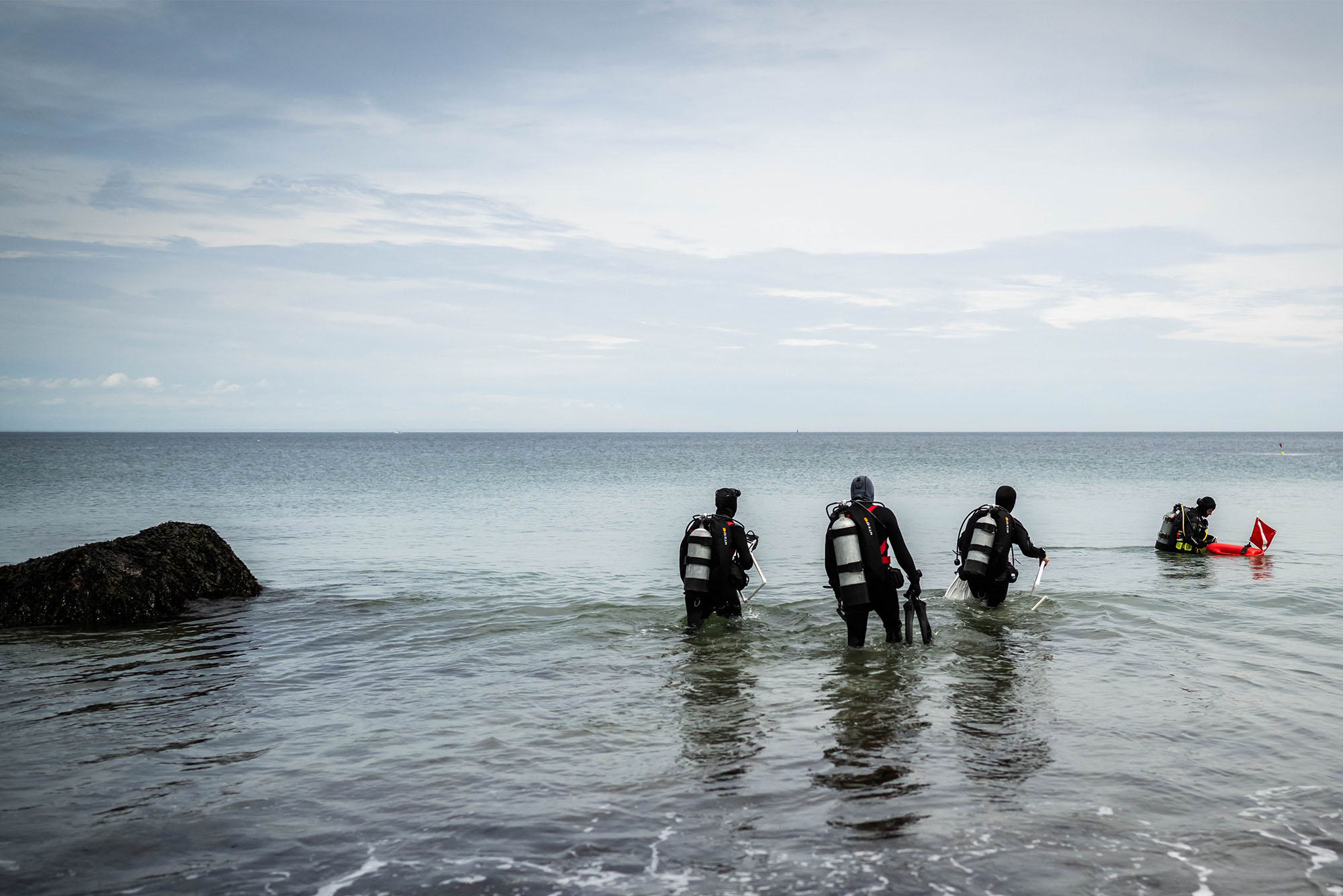
On the quiet shores of Rockport, Mass., a group of marine scientists enter the water to learn the ins and outs of scientific scuba diving, as they prepare for a research trip across the globe that will test their skills.
Keeping BU’s Researchers Safe under the Waves
BU’s dive safety officer Lizzie McNamee trains students to do underwater marine science research
In the town of Rockport, Mass., empty lobster pots line the end of a public pier and fishing boats bob in the bay, as residents and summer visitors stroll the dock. Three minutes down the road, at a small cove called Old Garden Beach, a group of divers lay air tanks, fins, masks, and various types of wet suits on a tarp.
The divers had made an early-morning drive from Boston University, their van full of scuba gear and research equipment. After today, three of them will become certified scientific divers—a necessary credential to safely perform underwater research and study the ocean firsthand.

Lizzie McNamee, BU Environmental Health & Safety’s dive safety program manager, is the one in charge of it all. From her presence and enthusiasm alone, it’s clear she loves her job training scientists to be professional divers, and teaching them how to stay safe while doing fieldwork. Halfway zipped in her suit, she calls the group to attention.
“Today, you’re going to be leaders,” McNamee (CAS’10) says to the divers in training: Paige Becker (GRS’29), a first-year PhD student in biology; Lili Vizer (GRS’28), a third-year PhD student in biology; and Fritz Francisco, a postdoctoral student at the University of Massachusetts Boston who collaborates with them. They’re joined by Peter Buston, a BU College of Arts & Sciences associate professor of biology—and an experienced research diver—who leads BU’s Marine Evolutionary Ecology lab.
It’s the final day of a training program that consists of 12 required dives, so it’s time for Becker, Vizer, and Francisco to demonstrate everything they’ve learned. But McNamee has no doubt that they’ll pass her tests. She’s been a certified diving instructor for 13 years. In less than a year of working at BU, she’s reviewed and approved scientific diving trips to destinations like Belize and Costa Rica. Training in local New England water suffices, and even adds an extra challenge for divers to navigate the notoriously murky, cold currents—a stark contrast from the clear waters of the tropics. Becker, Vizer, and Francisco are McNamee’s first scientific diving certifications for the University.

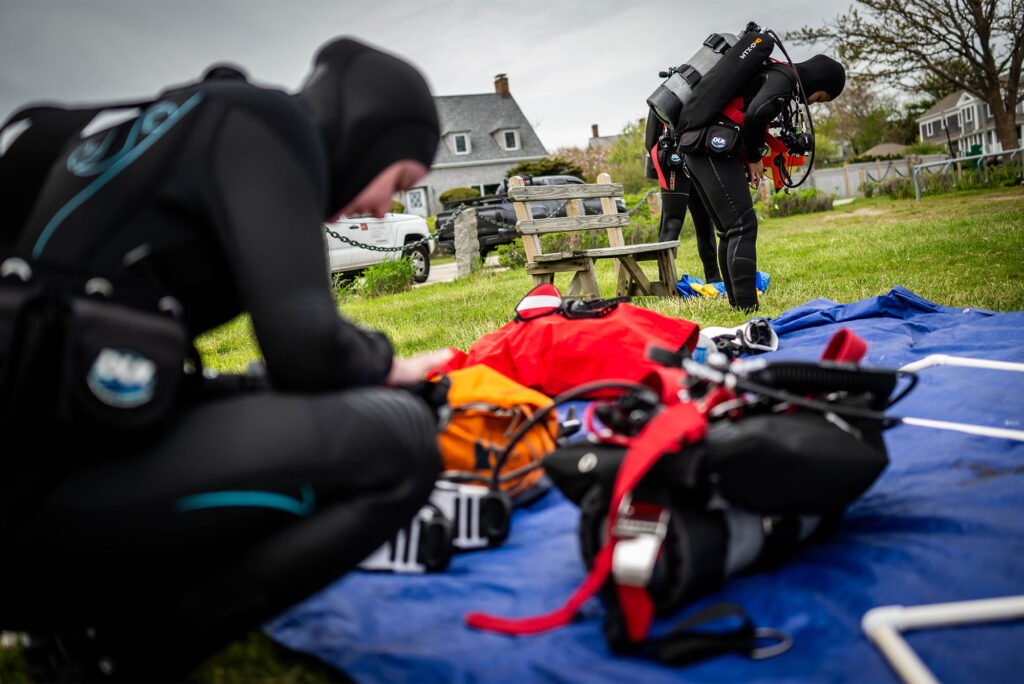
“If they can dive here, they can basically dive anywhere,” says Buston, applying sunscreen under the warm morning sun. Buston is especially pleased that the students are getting this training—he, Becker, Vizer, Francisco, and other students in the Marine Evolutionary Ecology lab are studying wild populations of clownfish in Papua New Guinea this summer. All of their scuba skills will be put to use almost immediately after the training is complete.
McNamee has everyone finish gearing up on the tarp. The beach is a popular local scuba spot. On the back of the “Welcome to Old Garden Beach” sign, there’s rules for divers: keep the beach clean, yield to swimmers, be respectful of local residents. They’re mindful of their volume, because despite the serious business of scientific diving and safety measures, there’s a playful energy that McNamee brings to her teaching, one that allows everyone to be their full, lively, human selves.
“I always tell them that I’m exactly who I am, and show up as my authentic self,” she says. “The social and emotional side of diving is so important to me, so I can make sure everyone feels comfortable speaking up.”
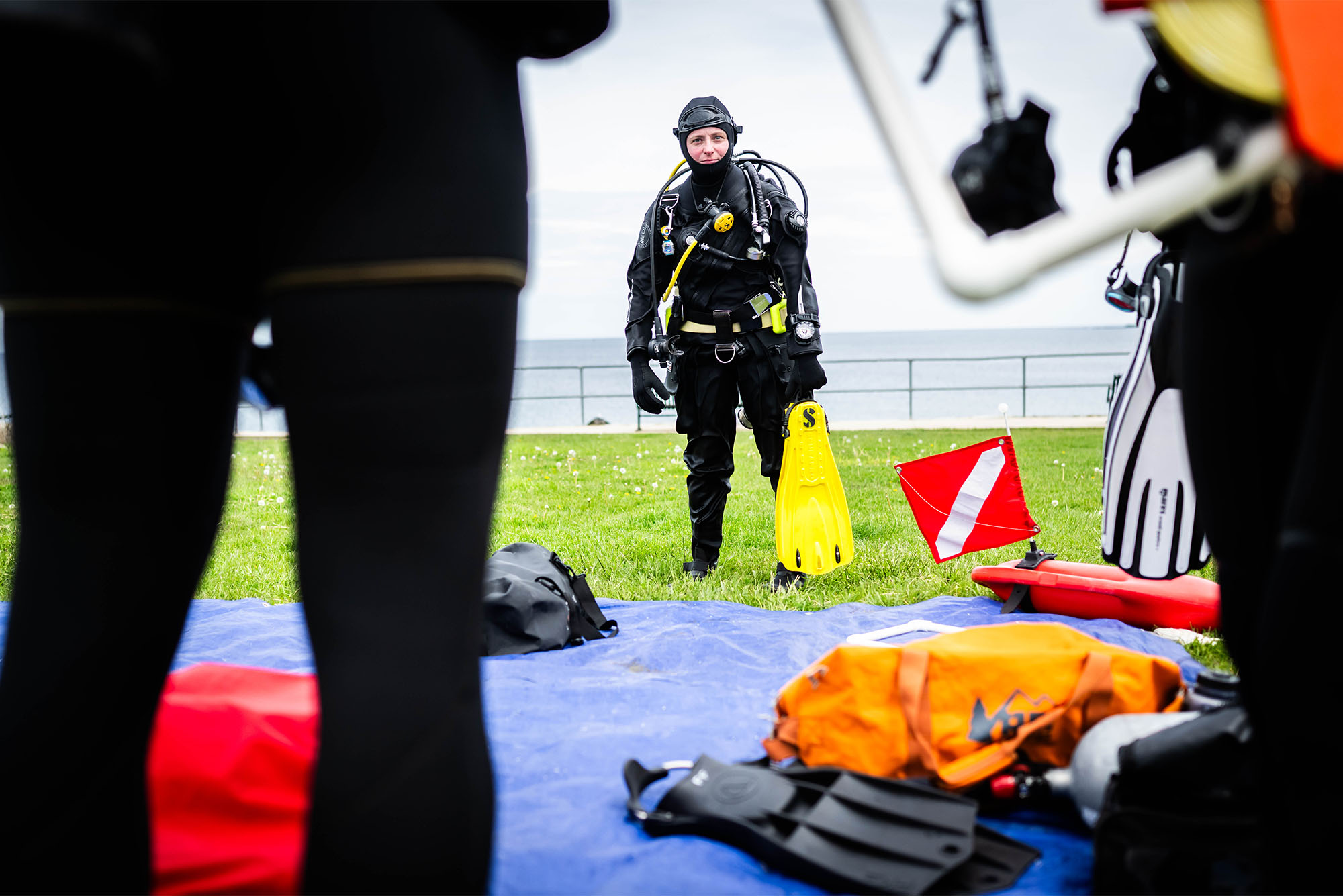
McNamee started her diving career as a marine science student—but her fascination with the ocean began well before college. She’s been scuba certified since she was 12 years old. As an undergraduate in BU’s Marine Science program, McNamee particularly enjoyed the fieldwork portion of her study abroad in Belize, which opened her eyes to the importance of scientific diving. She graduated and moved to Florida, where she got her captain’s license while working as an educator at the MarineLab Environmental Education Center in Key Largo, and later earned two master’s degrees from Florida Atlantic University—one in environmental science, and one in education, a seemingly perfect blend of her two passions. Now, back at BU—where she’s also the dive safety officer for the Scientific Diving & Marine Operations program—she’s part of a larger team dedicated to educating researchers and giving them the tools to perform their work to the best of their abilities.
Alongside her role as program manager and teacher, McNamee also serves as secretary for the American Academy of Underwater Sciences, as well as a board member for its foundation, where she works to make diving more accessible with scholarship programs for students from underrepresented backgrounds. It’s been reported that Black women, for example, are vastly underrepresented in ocean science, making up less than 2 percent of graduate students.
“I feel honored to show young students that there are people like me in their field, a petite woman,” she says. “And [to] make space for people who might not feel like they belong.”
Prepare to Breathe, Dive, and Multitask
Before they head to the water, McNamee asks Becker to remind everyone of the hand signals to communicate underwater—like the “OK” symbol meaning that you’re feeling good, a “so-so” hand tilt to signal that something isn’t quite right, and a thumbs-up to say that it’s time to swim up to the surface. Becker even creates a new signal on the spot—a little finger-wag dance to show that you’re having fun.
In Papua New Guinea this summer, Becker will focus on studying how clownfish negotiate parental care. Clownfish live in a complex social hierarchy, with one female breeder leading the group.
“The females are much bigger than the males,” Becker says. “The male breeder will clean the eggs and do the majority of the care. But she’ll chase him around and act aggressively if she thinks he’s not doing enough work.”
The research trip will be the first time she’ll see clownfish colonies in the wild, and she and Francisco will be collecting video footage to analyze in the lab. She’ll be watching to see how often the males are tending to the eggs and how often the female is showing that aggressive behavior.
“I can’t even fathom what I’m going to see there,” says Becker of her excitement about the trip. “My mask might fill up with tears.”
Once the divers are briefed on the day’s training plan in Rockport, they walk from the tarp to the shore. Standing in hip-high water, they start practicing extractions—an extremely important safety drill on how to carry someone out of the water and extract them from their wet suit. In a life-threatening situation, like falling unconscious while underwater, it’s essential for fellow divers to know how to rescue a person in need. After everyone has the chance to practice carrying someone, they review different research tools on land before diving under.
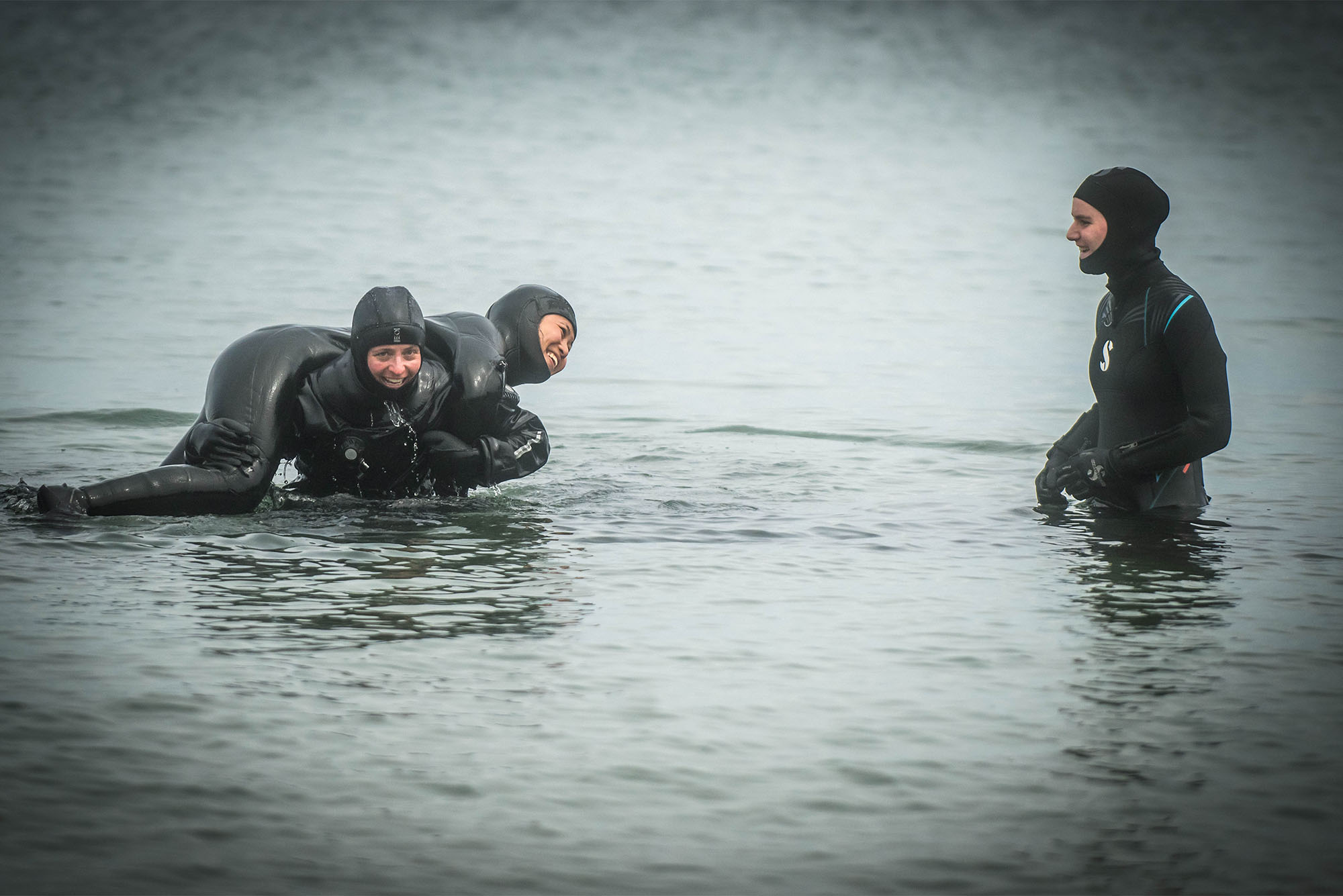
Safety obviously comes first in scientific diving school, just like it does for recreational diving. One of the huge differences, though, is the multitasking involved: researchers also need to use tools underwater. The divers learn how to take measurements, called a transect, sample different sized areas, and write on an underwater slate.
“To Lizzie, it’s second nature, but I still have to remind myself to breathe sometimes, because there’s so much to think about,” says Vizer. She studies another aspect of clownfish social hierarchies, specifically how they control their growth. Cohabiting clownfish live in friendly competition with one another based on their size and color, and it’s been observed that when a larger clownfish dies, all of the smaller fish will have a period of fast growth to move up a rank in their group, while maintaining their size differences between each other.
“They’re growing very precisely,” she says. “We don’t know how they do it.” On the research trip with Buston, she’ll be taking tissue samples to try to figure out what genes and other biological mechanisms are responsible for their growth spurts.
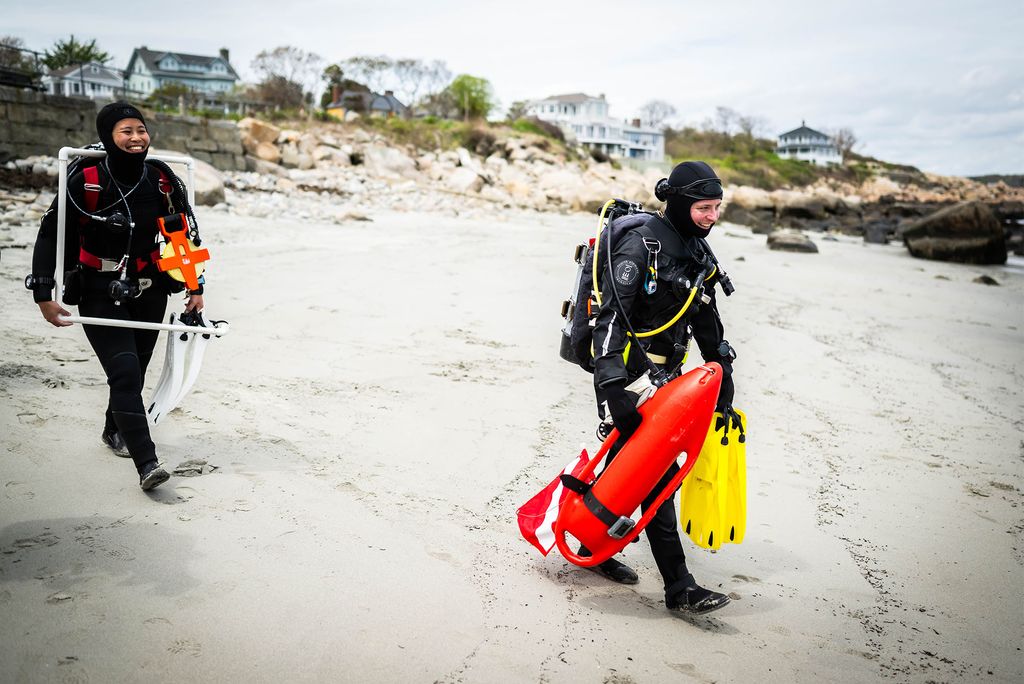

After practicing safety drills, McNamee and the group are ready to dive. Of all the lessons, skills, and regulations to follow, McNamee wants to make sure they walk—or swim—away from the training feeling empowered to keep themselves safe.
“The rule in scuba diving is that anyone can end a dive at any time, for any reason,” McNamee says. “My goal is to make it so everyone feels comfortable doing that, because this isn’t recreational diving, this is work. Going on a trip with limited time and funding to get research done can make some people feel a lot of pressure to perform. And that just adds risk.”
The group struts in their suits, masks, and tanks across the sand to the water, wading in, until eventually they disappear below the surface, where they see the world that flourishes below the cresting waves speckled with sunlight—flounder, crabs, lobster, mollusks, and plant life. They do three dives over the course of two hours with small breaks to regroup. When they emerge on the beach at the end of the day, they are certified and confident to dive in unfamiliar waters on the other side of the globe, all thanks to McNamee.
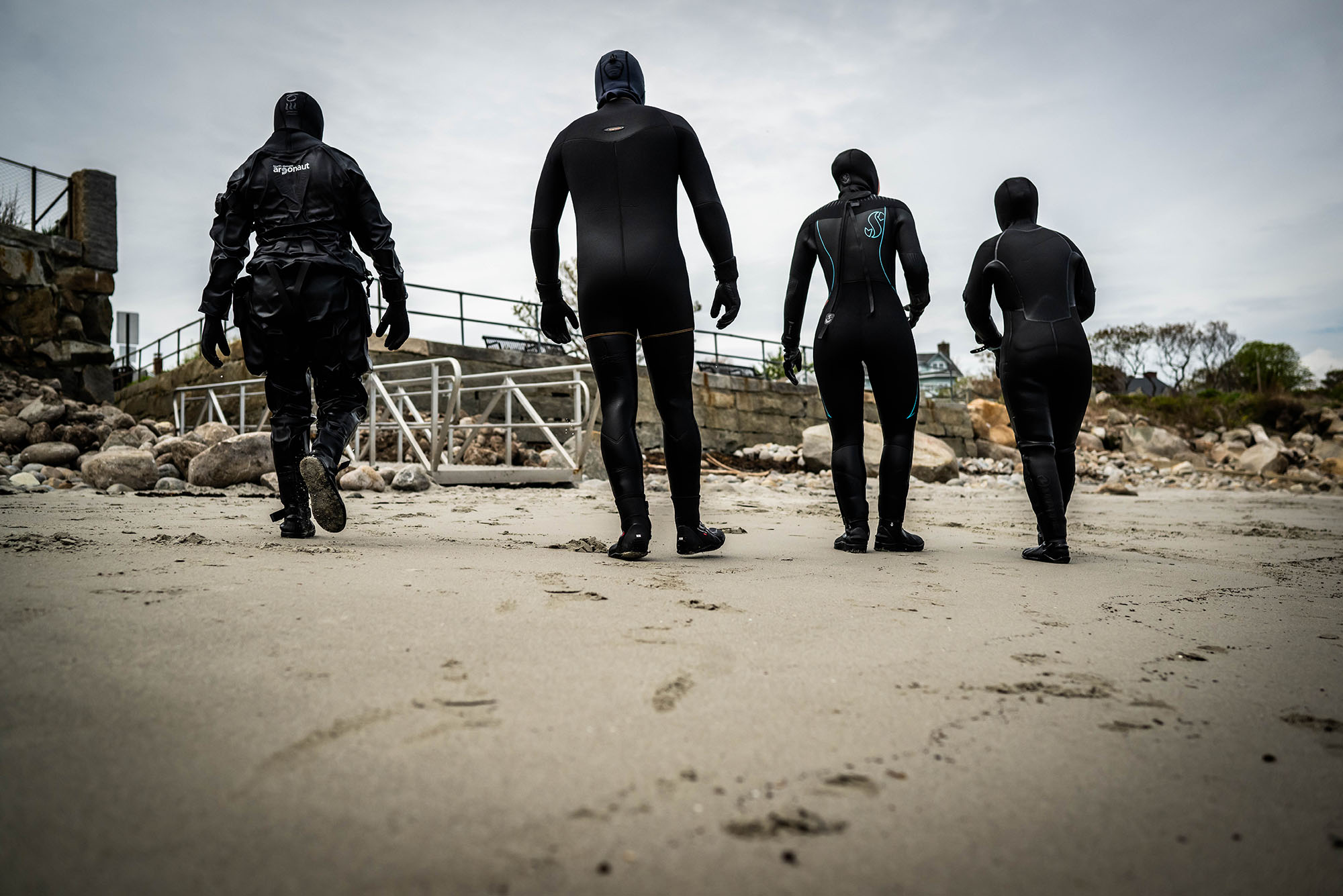
“I love seeing those aha moments for students, when they realize that they can do hard things, and when they see something new that makes them appreciate the ecosystem they live in a little bit more,” she says.
McNamee is leading more scientific dive trainings this summer, as well as fall courses, where the work begins in the BU Fitness & Recreation Center swimming pool. Those 100-hour occupational courses include conditioning, swim tests, medical training like CPR and first aid, and instruction in federal and local standards.
“Having someone like Lizzie is invaluable,” Buston says. “It means [the students] can be confident in themselves in the field, I can be confident that they know what they’re doing, and we can get straight to the research.”

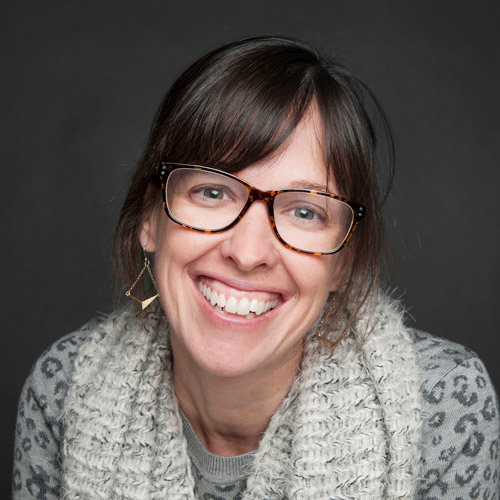
Comments & Discussion
Boston University moderates comments to facilitate an informed, substantive, civil conversation. Abusive, profane, self-promotional, misleading, incoherent or off-topic comments will be rejected. Moderators are staffed during regular business hours (EST) and can only accept comments written in English. Statistics or facts must include a citation or a link to the citation.